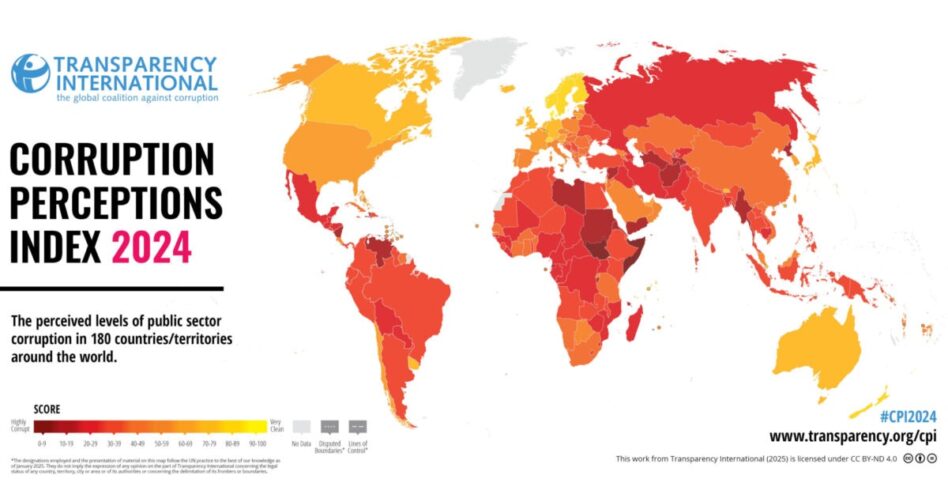
IN the 2024 Corruption Perceptions Index (CPI) published by Transparency International Malaysia (TI-M) has managed to hold on to its score of 50 out of 100, just like it did in 2023.
This score places Malaysia in the 57th spot among 180 countries, and no surprise, that’s exactly where it was last year too!
Now, the CPI is quite a straightforward affair. It rates countries based on how corrupt people think their public sector is, with scores running from 0, which suggests corruption is rampant there, to 100, where things are as clean as a whistle.
This year, Denmark, Finland, and Singapore decided to flex their spotless reputations by leading the pack with scores of 90, 88, and 84, respectively.
But let’s not rest on our laurels just yet. TI-M has pointed out that there’s always room for improvement if we want to see the country striding confidently into the top 25 rankings globally by 2033.
To achieve this ambitious dream, Malaysia needs to work its way up to scores between 68 and 70, which means an annual jump of at least 2 points. Now that’s a bit of a challenge, isn’t it?

On a brighter note, 2024 has seen some promising changes. In June, the National Anti-Corruption Strategy (NACS) took its first steps, and a special task force has been whipped up to help propel Malaysia into that coveted top 25 spot.
Let’s not forget the passing of the Public Finance and Fiscal Responsibility Act 2023 (Act 850) which hopefully lays down some solid ground for financial integrity.
They’ve also amended a few acts, like the Audit (Amendment) Act 1957 and the Companies Act, to make sure people have to reveal who really owns those companies—talk about shining a light in dark corners!
But, of course, it isn’t all sunshine and rainbows. There are still some bumps on the road, especially with those high-profile cases that have resulted in what they call a Discharge Not Amounting to Acquittal (DNAA).
Many folks are murmuring about the shadow of political interference looming over the judiciary, which isn’t the best recipe for public confidence.
To quicken the pace of necessary reforms, some good suggestions are out there. Amending the Whistleblower Protection Act 2010, bringing forth the Freedom of Information (FOI) Bill for a little light on things, and introducing the Political Financing Bill to get a grip on political funding are all steps that could pave a smoother path for Malaysia.
Why is Malaysia’s ranking stagnant?
The political interference in high-profile cases—cases involving high-ranking officials—often result in a DNAA, raising concerns about selective prosecution and political influence.
The weak whistleblower protections current whistleblower protection Act 2010 lacks robust safeguards, discouraging individuals from reporting corruption.
It require true and comprehensive protection to whistleblowers, which prevent individuals from being apprehensive.
There is a lack of transparency in public procurement like government contracts and major infrastructure projects which often lack transparency, leading to inefficiency and leakages.
There is a gaps in political financing Laws, unregulated political donations and a lack of accountability in campaign financing, increase the risk of corruption. Legislation need to be amended or fresh legislation need to be created.
There is a lack of judicial and institutional weaknesses, and although Malaysia has independent agencies like the Malaysian Anti-Corruption Commission (MACC), perceived political pressure affects their effectiveness, as it comes under the Prime Minister’s Office.
What should be done?

First, we need to fortify the judicial system, ensuring that both judges and law enforcement dance to their own tunes, free from political meddling in corruption cases.
Next, a revisiting of the whistleblower protection act is in order to enhance legal safeguards. This would encourage people to report without the worry of retaliation lurking in the shadows.
When it comes to transparency in public procurement, implementing open tender systems for government contracts is a must. Compiling and publishing procurement details would shoo away the darkness of opaque dealings.
Let’s not forget the need for political financing laws—to regulate and disclose those elusive political donations. Establishing strict limits on the sources of campaign funding is akin to putting a leash on a runaway puppy.
The accountability of our anti-corruption agencies must also take centre stage. Strengthening MACC’s independence with more say in Parliament would pave the way for fair investigations, free from the taint of political bias.
The overdue Freedom of Information (FOI) Bill is another vital piece of the puzzle. Granting the public access to government records will peel away layers of secrecy like an onion, encouraging diligent investigative journalism that seeks to uncover corruption.
Moreover, there’s a lack of public awareness and civic engagement in promoting anti-corruption efforts. Imagine if schools and universities played a larger role in this journey, inspiring citizens to keep an eye on government activities.
If the Malaysian government harbours dreams of breaking into the top 25 of the CPI by 2033, it must embark on immediate and bold reforms.
Without genuine political will and robust institutional frameworks, corruption will continue to strangle economic growth and public trust.
The time for decisive action is now! We can’t rely solely on the occasional capture of a “small fry”; we need to reel in the big fish for a proper court appearance, complete with charges and appropriate punishments!
KT Maran is a Focus Malaysia viewer.
The views expressed are solely of the author and do not necessarily reflect those of MMKtT.
- Focus Malaysia.



No comments:
Post a Comment
Note: Only a member of this blog may post a comment.